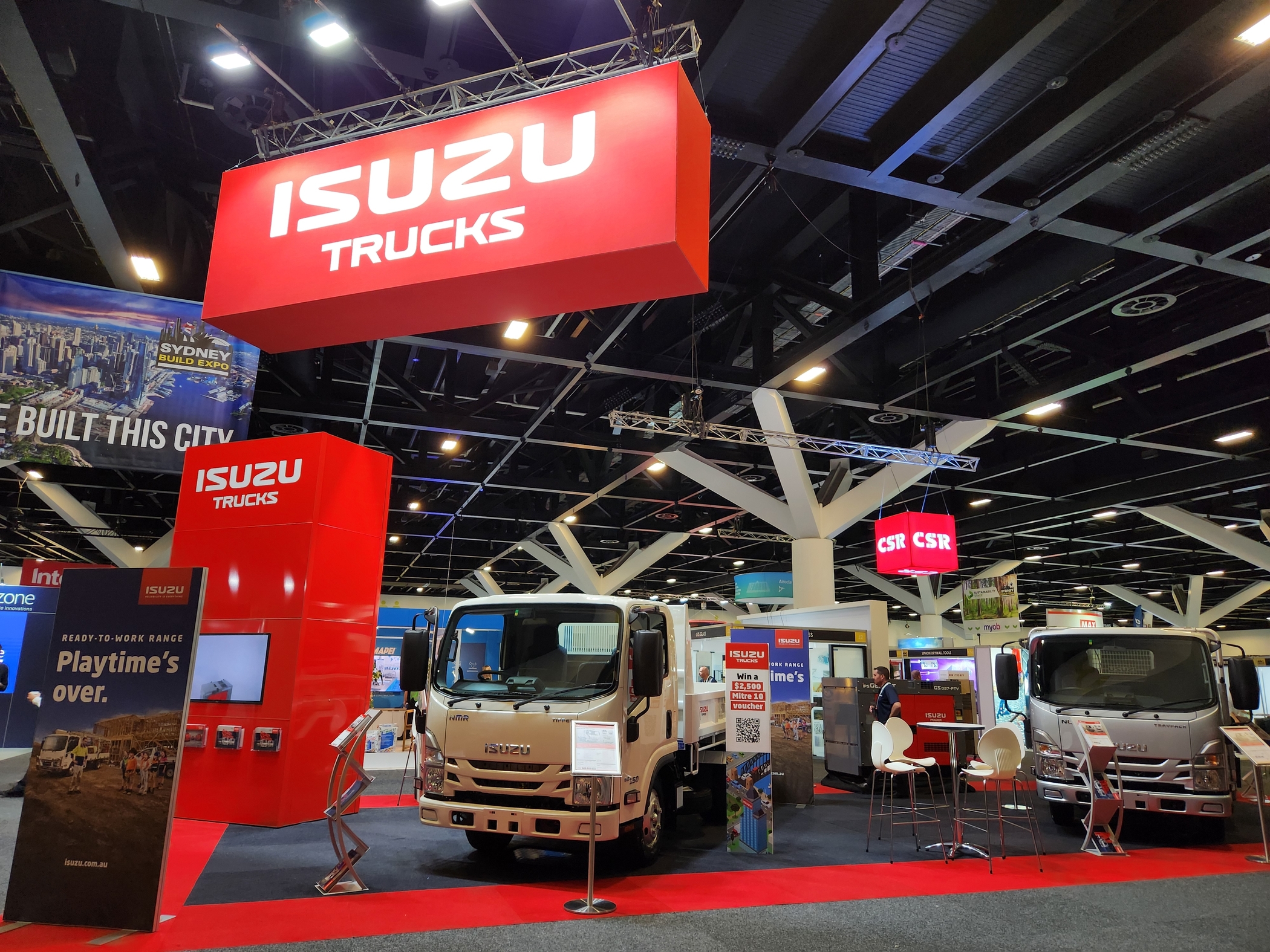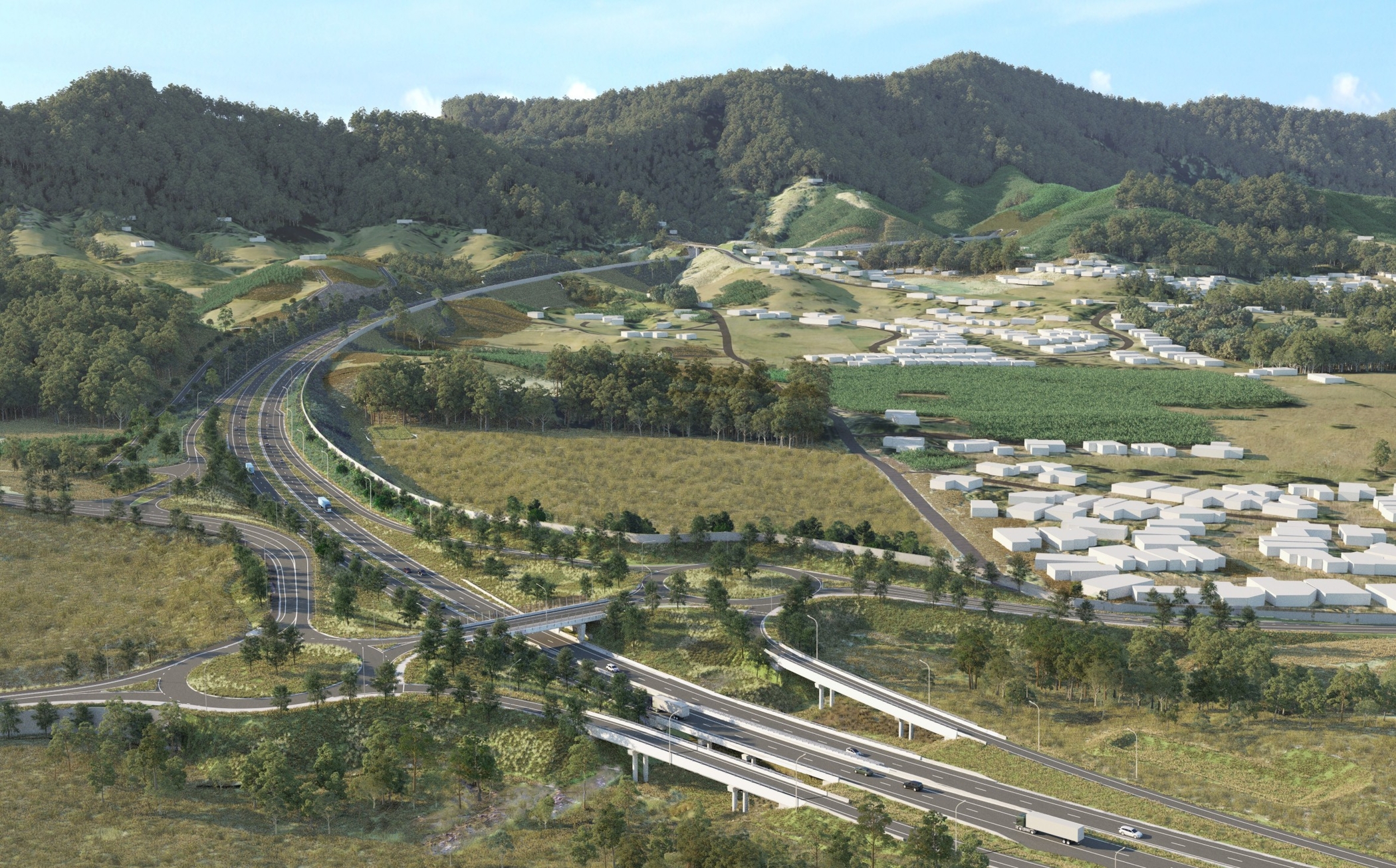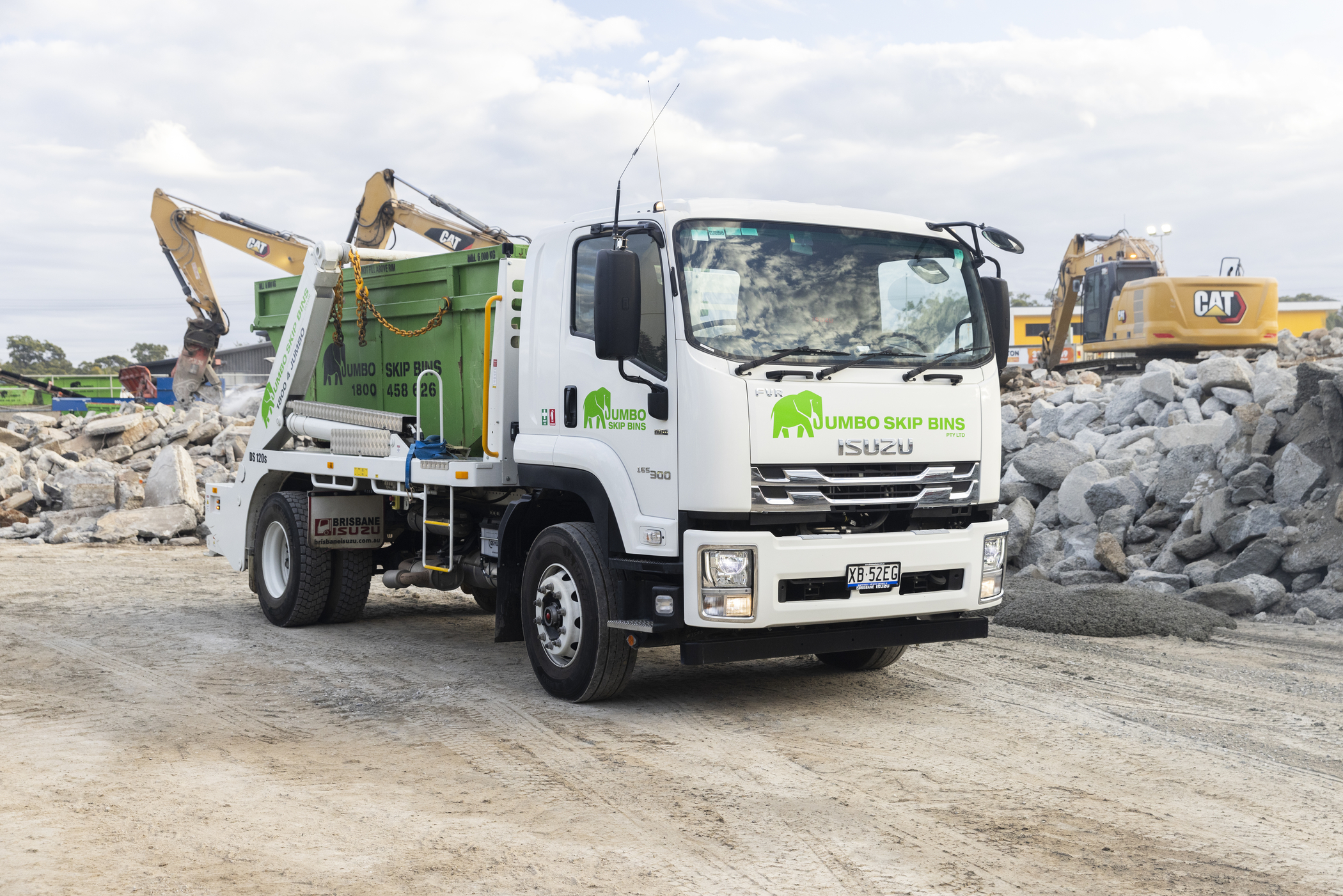A Day In The Life: Belinda McKimmie Livestock Transport
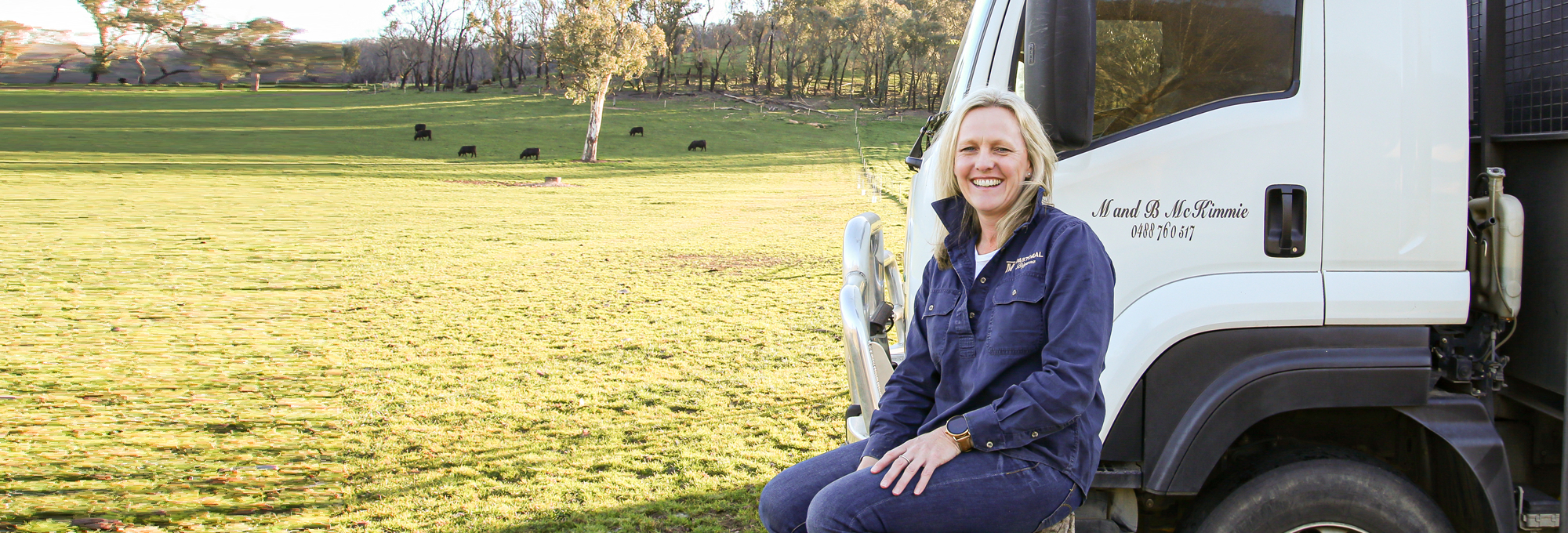
Farmer, entrepreneur, wife, mother, truck driver—there are many titles that describe Belinda McKimmie, and energetic is certainly amongst them.
Belinda’s passion for work and life shines through as she talks us through her day as Co-owner and Manager of a Black Angus cattle farm and livestock transport business—M & B McKimmie Transport—tucked away on the border of New South Wales and Victoria in the Australian Alps.
While Belinda and her husband Mal usually divide the farming and transport duties between them, since the 2019/2020 summer bushfires Belinda has taken on all the trucking duties for the business, doing both short carting and long-distance, heavy haul livestock jobs in their Isuzu FXY 1500 truck while Mal works on fire recovery at the farm.
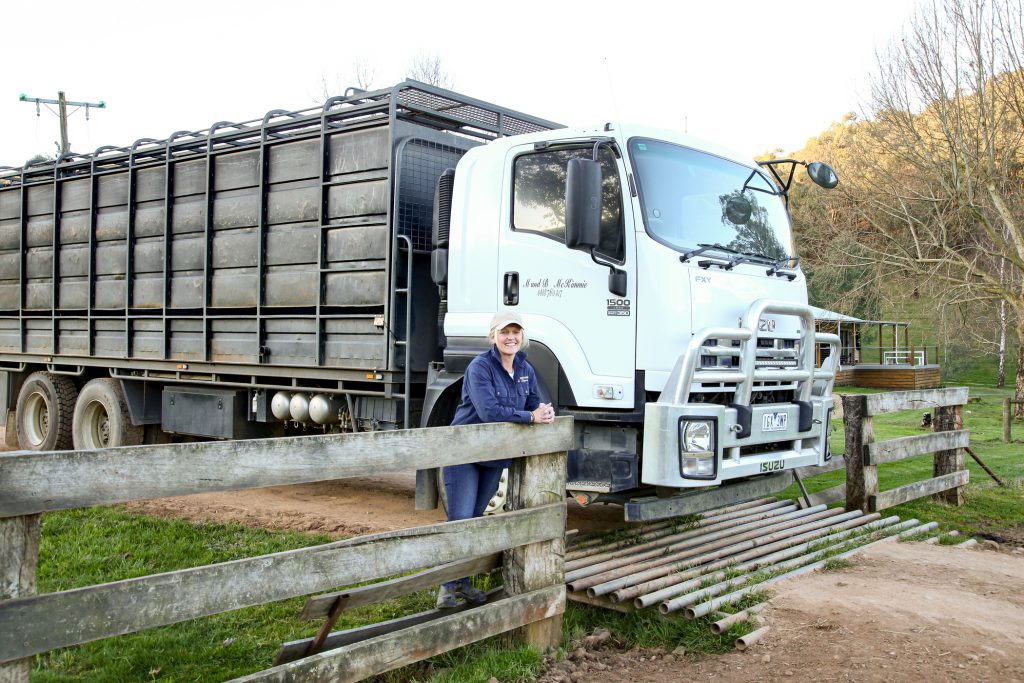 Tell us about the farm, is your family also in the business?
I’d always been interested in horses, I’m an outdoors person. But before I met my husband Mal, and we started our own family farm, I hadn’t done any sort of farm work before.
A while ago now, when Mal was rehabilitating from a serious work injury, I did milking on a nearby property. The owner was very patient with me, he was great at teaching me about the cows and how the dairy industry worked. I also joined a local beef group.
I’ve had more learning experience over the past four to five years. Mal and I have been doing workshops and seminars together to try and change the way we do things: implementing programs within our farm business, enhancing quality of the produce and improving our bottom line.
What do you love most about working the land?
The freedom. The freedom of running our own business. We can set our own rules and what we’re going to do each day. And the animals make my day, they’re always there for you. We use the horses and dogs on the farm for all our cattle work, so it’s a huge part of our lives.
I’ve always enjoyed driving too, getting out and travelling. I think the truck works really well in splitting up the farm work with something different. No day in the truck is ever the same, but I also come home and have the stability of the farm at my back.
Tell us about the farm, is your family also in the business?
I’d always been interested in horses, I’m an outdoors person. But before I met my husband Mal, and we started our own family farm, I hadn’t done any sort of farm work before.
A while ago now, when Mal was rehabilitating from a serious work injury, I did milking on a nearby property. The owner was very patient with me, he was great at teaching me about the cows and how the dairy industry worked. I also joined a local beef group.
I’ve had more learning experience over the past four to five years. Mal and I have been doing workshops and seminars together to try and change the way we do things: implementing programs within our farm business, enhancing quality of the produce and improving our bottom line.
What do you love most about working the land?
The freedom. The freedom of running our own business. We can set our own rules and what we’re going to do each day. And the animals make my day, they’re always there for you. We use the horses and dogs on the farm for all our cattle work, so it’s a huge part of our lives.
I’ve always enjoyed driving too, getting out and travelling. I think the truck works really well in splitting up the farm work with something different. No day in the truck is ever the same, but I also come home and have the stability of the farm at my back.
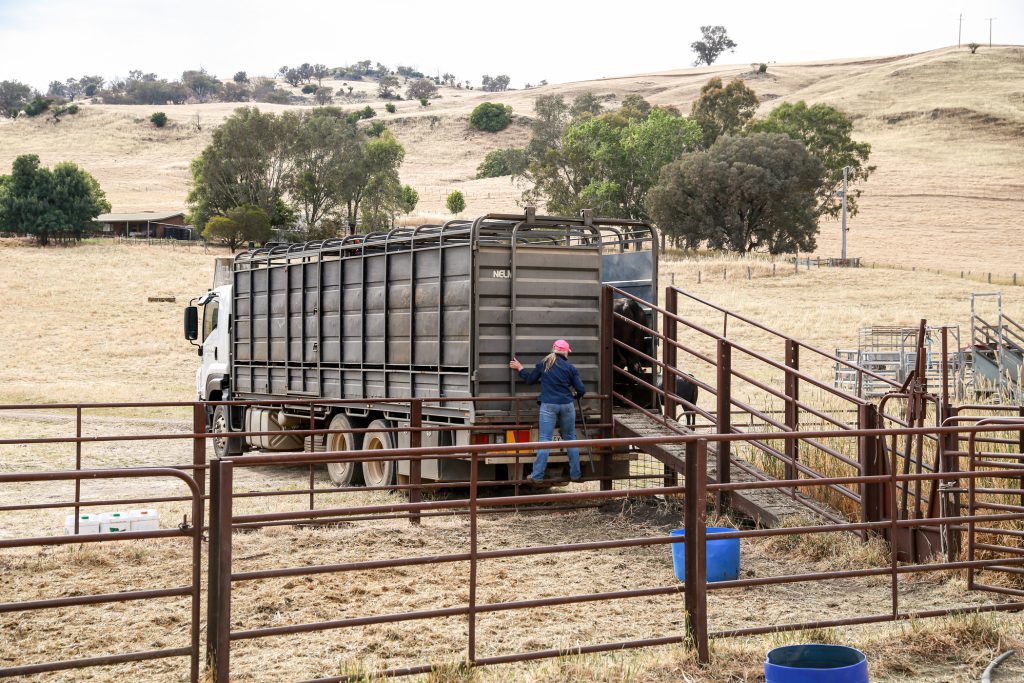 What does a typical week look like for you?
Since the bushfires, I am driving the truck full time and work on the farm between jobs. If we have any big cattle work to do, we’ll plan it for the days I don’t have trucking jobs, so we can both get in and do the work together.
We used to plan our week so that I was in the truck Monday (our busier day) and Mal was in the truck Tuesday doing short-carting work. On the Mondays when I was away, Mal and our three teenage boys would cook and do household chores. There’s a lot of job sharing in our house. There’s no, “he does, she does” here, everyone pitches in to help.
How do your customers react to seeing a female truck driver pull up?
Sometimes my customers are a bit concerned that being female, I might not be able to handle the cattle. And sometimes it can be difficult, strength-wise.
But it’s just about how you go about setting up the jobs, being creative and resourceful and not putting yourself in dangerous spots.
I set up gates and work around the cattle, I know I can get cattle in the truck safely on my own and do it well. As long as we get the job done and it’s done safely for the cattle, I don’t see that there’s any difference to being male or female in this work.
Working in both farming and trucking, have you seen any changes to these industries over the years?
There have been changes to the Chain of Responsibility laws for operating transport vehicles. People are talking about it a lot more, becoming more aware that there are dangers for all parties involved: the transport driver, farmer, agent, young people who might be working the yards.
People are starting to think more about improving situations so that it’s better for the cattle and better for the safety of everyone. In our area, people are becoming conscientious of how their stock are dealt with in the yards. There are lots of on-farm incentive programs for quiet cattle—feed lots don’t want to bring in upset animals.
What does a typical week look like for you?
Since the bushfires, I am driving the truck full time and work on the farm between jobs. If we have any big cattle work to do, we’ll plan it for the days I don’t have trucking jobs, so we can both get in and do the work together.
We used to plan our week so that I was in the truck Monday (our busier day) and Mal was in the truck Tuesday doing short-carting work. On the Mondays when I was away, Mal and our three teenage boys would cook and do household chores. There’s a lot of job sharing in our house. There’s no, “he does, she does” here, everyone pitches in to help.
How do your customers react to seeing a female truck driver pull up?
Sometimes my customers are a bit concerned that being female, I might not be able to handle the cattle. And sometimes it can be difficult, strength-wise.
But it’s just about how you go about setting up the jobs, being creative and resourceful and not putting yourself in dangerous spots.
I set up gates and work around the cattle, I know I can get cattle in the truck safely on my own and do it well. As long as we get the job done and it’s done safely for the cattle, I don’t see that there’s any difference to being male or female in this work.
Working in both farming and trucking, have you seen any changes to these industries over the years?
There have been changes to the Chain of Responsibility laws for operating transport vehicles. People are talking about it a lot more, becoming more aware that there are dangers for all parties involved: the transport driver, farmer, agent, young people who might be working the yards.
People are starting to think more about improving situations so that it’s better for the cattle and better for the safety of everyone. In our area, people are becoming conscientious of how their stock are dealt with in the yards. There are lots of on-farm incentive programs for quiet cattle—feed lots don’t want to bring in upset animals.
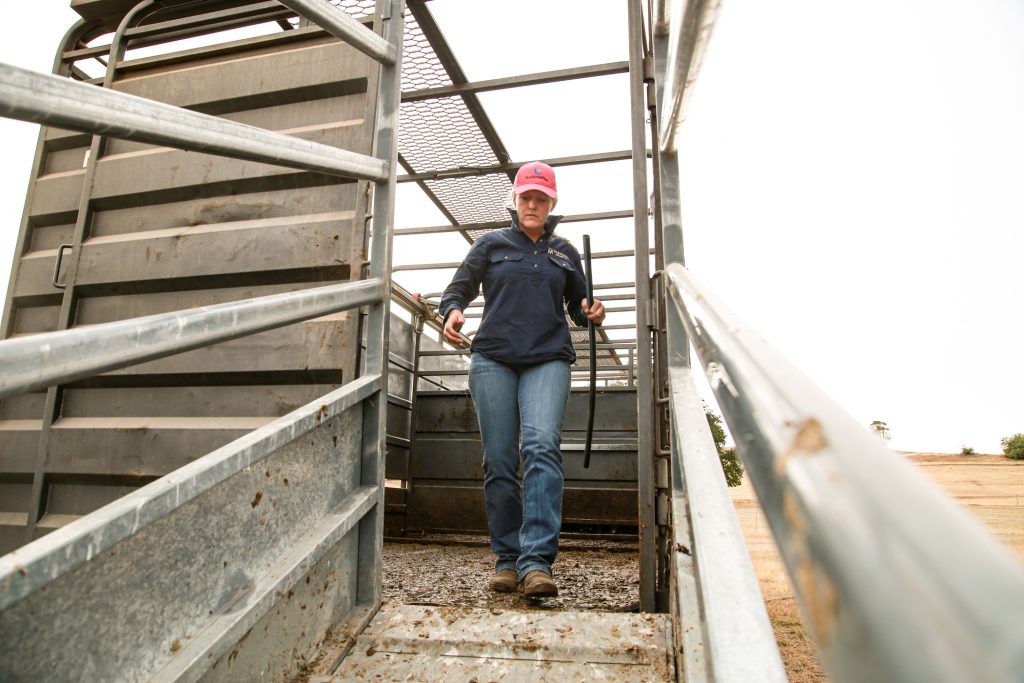 Do you have any advice for women who might be looking at a career in these fields?
If it’s something that you want to do, absolutely do it. Jump in and have a go, you’ve got nothing to lose and everything to gain.
I think once there are a few more females breaking into trucking, women will see there’s jobs that they could easily do, enjoy and be rewarded. There’s no reason whatsoever that women can’t drive trucks.
There’s a lot of farm work that women can handle too. Think about what else you can do on the farm that will compliment your business—it might be driving a cattle truck or expanding your skills and services in some other way.
Do you have any advice for women who might be looking at a career in these fields?
If it’s something that you want to do, absolutely do it. Jump in and have a go, you’ve got nothing to lose and everything to gain.
I think once there are a few more females breaking into trucking, women will see there’s jobs that they could easily do, enjoy and be rewarded. There’s no reason whatsoever that women can’t drive trucks.
There’s a lot of farm work that women can handle too. Think about what else you can do on the farm that will compliment your business—it might be driving a cattle truck or expanding your skills and services in some other way.
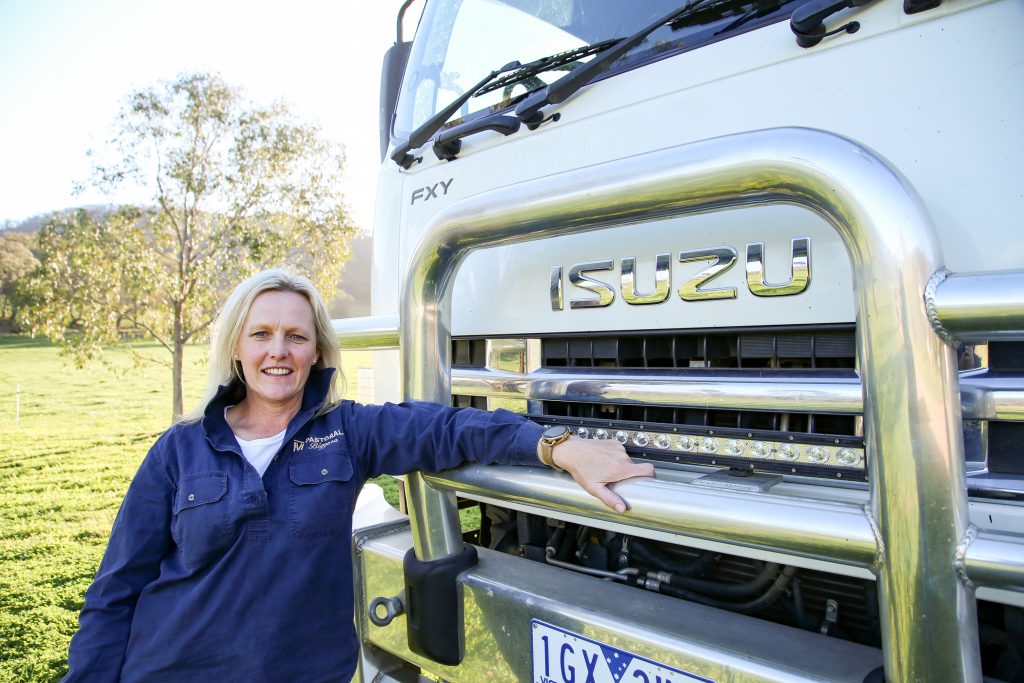

 Tell us about the farm, is your family also in the business?
I’d always been interested in horses, I’m an outdoors person. But before I met my husband Mal, and we started our own family farm, I hadn’t done any sort of farm work before.
A while ago now, when Mal was rehabilitating from a serious work injury, I did milking on a nearby property. The owner was very patient with me, he was great at teaching me about the cows and how the dairy industry worked. I also joined a local beef group.
I’ve had more learning experience over the past four to five years. Mal and I have been doing workshops and seminars together to try and change the way we do things: implementing programs within our farm business, enhancing quality of the produce and improving our bottom line.
What do you love most about working the land?
The freedom. The freedom of running our own business. We can set our own rules and what we’re going to do each day. And the animals make my day, they’re always there for you. We use the horses and dogs on the farm for all our cattle work, so it’s a huge part of our lives.
I’ve always enjoyed driving too, getting out and travelling. I think the truck works really well in splitting up the farm work with something different. No day in the truck is ever the same, but I also come home and have the stability of the farm at my back.
Tell us about the farm, is your family also in the business?
I’d always been interested in horses, I’m an outdoors person. But before I met my husband Mal, and we started our own family farm, I hadn’t done any sort of farm work before.
A while ago now, when Mal was rehabilitating from a serious work injury, I did milking on a nearby property. The owner was very patient with me, he was great at teaching me about the cows and how the dairy industry worked. I also joined a local beef group.
I’ve had more learning experience over the past four to five years. Mal and I have been doing workshops and seminars together to try and change the way we do things: implementing programs within our farm business, enhancing quality of the produce and improving our bottom line.
What do you love most about working the land?
The freedom. The freedom of running our own business. We can set our own rules and what we’re going to do each day. And the animals make my day, they’re always there for you. We use the horses and dogs on the farm for all our cattle work, so it’s a huge part of our lives.
I’ve always enjoyed driving too, getting out and travelling. I think the truck works really well in splitting up the farm work with something different. No day in the truck is ever the same, but I also come home and have the stability of the farm at my back.
 What does a typical week look like for you?
Since the bushfires, I am driving the truck full time and work on the farm between jobs. If we have any big cattle work to do, we’ll plan it for the days I don’t have trucking jobs, so we can both get in and do the work together.
We used to plan our week so that I was in the truck Monday (our busier day) and Mal was in the truck Tuesday doing short-carting work. On the Mondays when I was away, Mal and our three teenage boys would cook and do household chores. There’s a lot of job sharing in our house. There’s no, “he does, she does” here, everyone pitches in to help.
How do your customers react to seeing a female truck driver pull up?
Sometimes my customers are a bit concerned that being female, I might not be able to handle the cattle. And sometimes it can be difficult, strength-wise.
But it’s just about how you go about setting up the jobs, being creative and resourceful and not putting yourself in dangerous spots.
I set up gates and work around the cattle, I know I can get cattle in the truck safely on my own and do it well. As long as we get the job done and it’s done safely for the cattle, I don’t see that there’s any difference to being male or female in this work.
Working in both farming and trucking, have you seen any changes to these industries over the years?
There have been changes to the Chain of Responsibility laws for operating transport vehicles. People are talking about it a lot more, becoming more aware that there are dangers for all parties involved: the transport driver, farmer, agent, young people who might be working the yards.
People are starting to think more about improving situations so that it’s better for the cattle and better for the safety of everyone. In our area, people are becoming conscientious of how their stock are dealt with in the yards. There are lots of on-farm incentive programs for quiet cattle—feed lots don’t want to bring in upset animals.
What does a typical week look like for you?
Since the bushfires, I am driving the truck full time and work on the farm between jobs. If we have any big cattle work to do, we’ll plan it for the days I don’t have trucking jobs, so we can both get in and do the work together.
We used to plan our week so that I was in the truck Monday (our busier day) and Mal was in the truck Tuesday doing short-carting work. On the Mondays when I was away, Mal and our three teenage boys would cook and do household chores. There’s a lot of job sharing in our house. There’s no, “he does, she does” here, everyone pitches in to help.
How do your customers react to seeing a female truck driver pull up?
Sometimes my customers are a bit concerned that being female, I might not be able to handle the cattle. And sometimes it can be difficult, strength-wise.
But it’s just about how you go about setting up the jobs, being creative and resourceful and not putting yourself in dangerous spots.
I set up gates and work around the cattle, I know I can get cattle in the truck safely on my own and do it well. As long as we get the job done and it’s done safely for the cattle, I don’t see that there’s any difference to being male or female in this work.
Working in both farming and trucking, have you seen any changes to these industries over the years?
There have been changes to the Chain of Responsibility laws for operating transport vehicles. People are talking about it a lot more, becoming more aware that there are dangers for all parties involved: the transport driver, farmer, agent, young people who might be working the yards.
People are starting to think more about improving situations so that it’s better for the cattle and better for the safety of everyone. In our area, people are becoming conscientious of how their stock are dealt with in the yards. There are lots of on-farm incentive programs for quiet cattle—feed lots don’t want to bring in upset animals.
 Do you have any advice for women who might be looking at a career in these fields?
If it’s something that you want to do, absolutely do it. Jump in and have a go, you’ve got nothing to lose and everything to gain.
I think once there are a few more females breaking into trucking, women will see there’s jobs that they could easily do, enjoy and be rewarded. There’s no reason whatsoever that women can’t drive trucks.
There’s a lot of farm work that women can handle too. Think about what else you can do on the farm that will compliment your business—it might be driving a cattle truck or expanding your skills and services in some other way.
Do you have any advice for women who might be looking at a career in these fields?
If it’s something that you want to do, absolutely do it. Jump in and have a go, you’ve got nothing to lose and everything to gain.
I think once there are a few more females breaking into trucking, women will see there’s jobs that they could easily do, enjoy and be rewarded. There’s no reason whatsoever that women can’t drive trucks.
There’s a lot of farm work that women can handle too. Think about what else you can do on the farm that will compliment your business—it might be driving a cattle truck or expanding your skills and services in some other way.



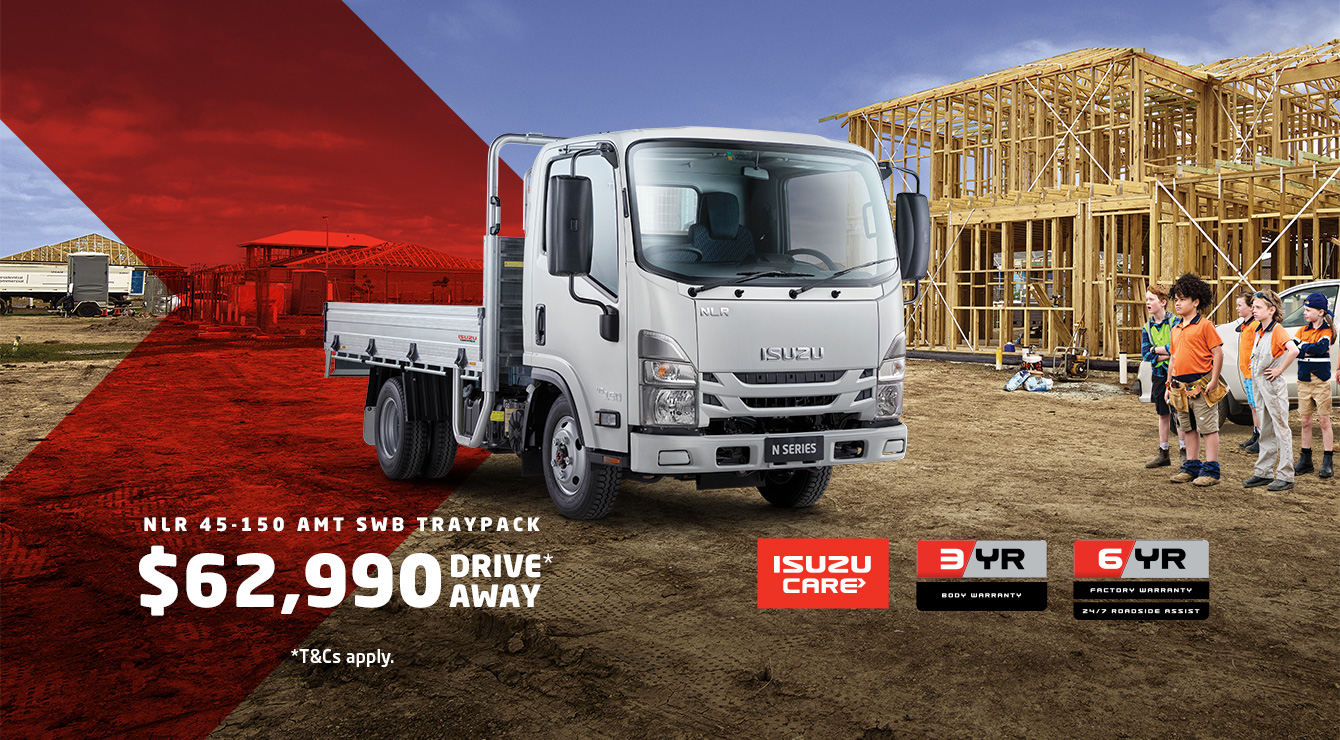
Playtime’s over, get $3,500* to spend on extras.
If you’re ready to get serious about tackling bigger jobs, grab yourself an NLR 45-150 AMT SWB Traypack from the Ready-to-Work range for $62,990 drive away*. And to prove we aren’t playing, buy any NLR Traypack before June 30 and you’ll get $3,500* to spend on genuine accessories or an Essentials service agreement.
Learn more
